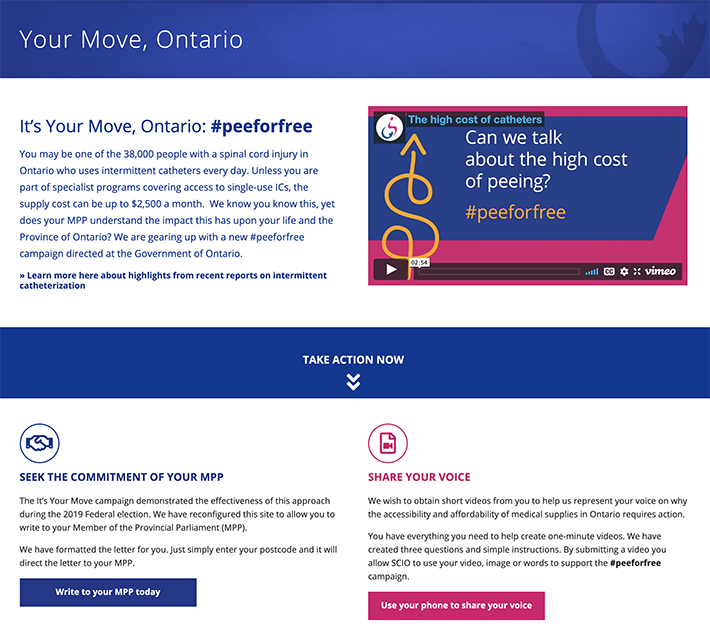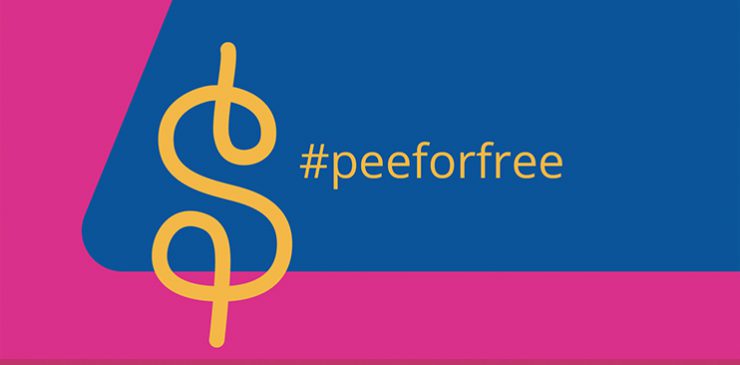The SCI community has inspired SCIO’s dynamic #peeforfree campaign. In asking what priorities around public policy are critical, access to medical supplies has come to the forefront. Officially launched in 2018, the campaign was paused to generate greater community involvement in advocating for accessible and affordable medical supplies. Here, we explore the progress made and three simple actions you can take from home. Your contribution will add an important personal voice to what we share with the Ontario government.
As intermittent catheters are critical bladder management aids for people with spinal cord injuries, our community is the best place to start to work with the government to improve funding models for better access and affordability of intermittent catheters.
“I believe comprehensive catheter coverage for Ontarians is an issue of equity and respect. Based upon best evidence, we should not expect patients to reuse single-use medical products, like intermittent catheters,” explains Dr. Dean Elterman. “Our catheter coverage lags behind the rest of the industrialized world, and our patients deserve better.”
7 domains
This work has engaged a Steering Committee, stakeholder briefing, online portal and two dedicated Town Hall sessions. The seven domains investigated are: user experience; user education; medical supply access; medical supply affordability; other medical supplies; Indigenous & rural communities and health economics.
Government relations consultant Nancy Abbey explains, “This project is vital as it will provide the Ontario government with the necessary compelling evidence for intermittent catheters to be appropriately funded to prevent patients from having to reuse catheters for financial reasons. Individuals should have access to a full complement of catheter options and be able to continue to use the catheter that best works for them as they transition through the healthcare system.”
A myriad of funding programs
You may be one of the 38,000 people with a spinal cord injury in Ontario who uses intermittent catheters every day. Unless you are part of specialist programs covering access to single-use ICs, the supply cost can be up to $2,500 a month.
What is very noticeable is that there are myriad reimbursement programs, yet they have not been looked at as a whole in this province. Different entities are layering upon other programs and often pitting against each other on who should pay. The red tape associated is exhausting for users in accessing funding. The SAIL program in Saskatchewan provides a benchmark model worthy of further investigation. Saskatchewan Aids to Independent Living (SAIL) provides assistance to people with physical disabilities to live a more active and independent lifestyle. It also helps people in the management of certain chronic health conditions. This umbrella program also includes the PARA program for people living with SCI and they cover 100% of all supplies, incuding all types of catheters, diapers, gloves, Condom catheters, leg and night bags, suppositories, underpads, wheelchairs, etc. We will explore these in more depth through the small working group.
“While we’re trying to support the future, we need to protect the people we serve every day as well, on a day to day basis,” reassures Peter Athanasopoulos.
It is motivating to see the energy behind special consideration for Indigenous and rural communities. What happens in Toronto is vastly different than what happens in other parts of Ontario.
Your Move Ontario

We’re gathering information through our working groups towards the policy report to redefine how funding for medical supplies functions in this province. SCIO’s government relations team will support communities interested in engaging decision-makers around submission to the Government of Ontario. We invite you to go to YourMoveOntario.ca.
The #peeforfree campaign complements the Rolling Through Barriers campaign with leaders telling us why they care about accessibility. User testimonials are a powerful voice with which to catch the attention of the government.
3 simple actions
We ask for your participation from the safety and comfort of your home.
- Visit the YourMoveOntario.ca webpage – learn more about peeforfree and summaries of the new reports
- Write to your MPP today – type in your postal code to send a personalized letter to your MPP. You can edit or send as is.
- Use Your Smartphone to Share Your Voice – follow the directions for recording a one-minute video using your smartphone. You have everything you need to help create one-minute videos. We have created three questions and simple instructions.






